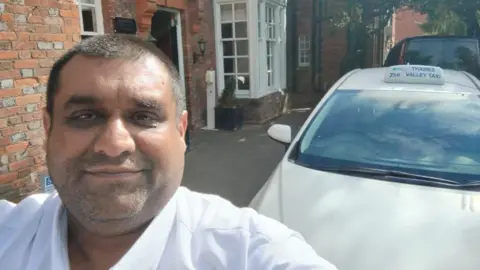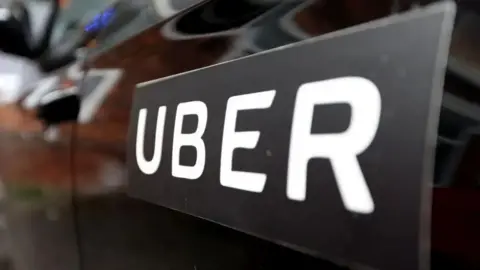Taxi driver says firm 'struggling' since Uber launch
 Yaseen Yusuf
Yaseen YusufA taxi driver has said he may be forced to close his business because of Uber's "aggressive" approach to pricing.
Yaseem Yusuf, who runs Thames Valley Taxis in Abingdon, Oxfordshire, said his trade was down 50% since Uber began operating in Oxford and the surrounding areas in February.
He said the company's practices were squeezing out local firms who could not afford to operate at a loss.
In a statement, Uber said "there is huge demand across the city which all operators can compete for".
Mr Yusuf, who has been running his business for three years, said his and other small taxi businesses could go under in two years.
"We're only small and the fear factor is that [Uber] might end up muscling us out of trade so we don't exist in the area".
He claims that large time-limited discounts offered by Uber left companies like his unable to compete.
"We can't match that because we have to find a way to replace the money we [would] be losing.
"Do we shop for cheaper fuel? For cheaper tyres? We're struggling to find ways to offer customers a good deal but also sustain a small business."
 Getty Images
Getty ImagesAn Uber spokesperson said: "The launch has improved transport options for everyone.
"Oxford is a thriving city with a huge workforce, student community and booming tourism sector - there is huge demand across the city which all operators can compete for.
"This is providing new earning opportunities for local drivers, all of whom have access to industry leading worker rights such as holiday pay and a pension, as well as formal representation through GMB Union."
In a statement, Councillor Anna Railton, deputy leader and cabinet member for a zero carbon Oxford, said: "The company's application and premises were reviewed against the council's criteria, and the licensing authority found no reason to refuse the application.
"The application was reviewed against the same criteria as all other private hire operators in the city."
But Mr Yusuf said that a large number of his regular customers were elderly, did not use smartphones and would lose out if firms like his went out of business.
"They have a very basic telephone and they give us a call, they are happy with our service.
"If we don't generate income, sadly the business will be lost."
Last month a University of Oxford study found that Uber's use of dynamic pricing had led to higher fares for passengers and lower earnings for drivers whilst increasing the company's share of revenue.
Uber said in response that some claims in the report were "totally false".
You can follow BBC Oxfordshire on Facebook, X, or Instagram.
